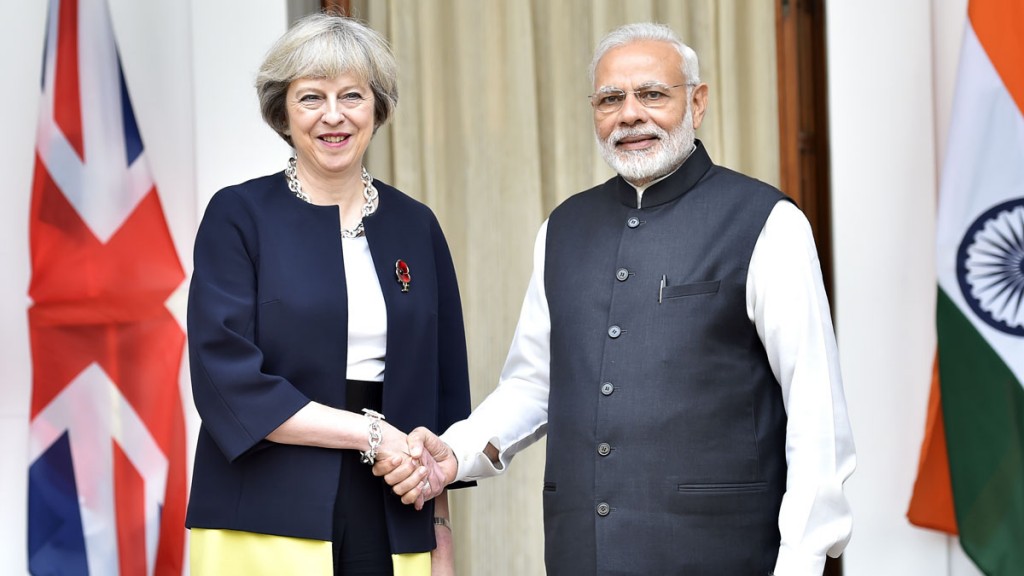
Having looked at the chances of an Anglo-American trade deal (reasonable, though not spectacular) we’re now going to turn our attention to the Commonwealth. This is a group of 52 nations, virtually all former British colonies, dominions and protectorates. Our guide will be Professor Philip Murphy of the Institute of Commonwealth Studies at the School of Advanced Studies of the University of London. While Professor Murphy is not a specialist economist, he has written extensively on the history and politics of the member countries. He also does research on contemporary British politics.
The biggest Commonwealth economy is India, the seventh largest economy in the world by GDP. If you adjust for differences in prices it is in third place, behind only China and the US (though the EU as a whole is still twice as large). What’s more, it is growing at around 5% a year. In theory, this combination of size, fast growth and historical ties makes it an ideal post-Brexit trading partner. However, Murphy is extremely sceptical about the chances of Britain being able to get any special deal from the emerging superpower.
The problem is that relations between Britain and India are still “pretty fragile”. Many Indian politicians “want to get away from the whole idea of the Commonwealth” which they see as an “imperial hangover”. This combination of indifference and outright hostility to the idea of any shared heritage means that appeals to historical ties are likely to hold “little currency” in New Delhi. This was starkly illustrated by the fact that during their visits to India, David Cameron and George Osborne “were largely silent about the Commonwealth”.
If Cameron and Osborne had little success in improving relations with India, Theresa May shouldn’t expect to do any better. The early indications are that India is going to be “hard-headed” about opening up its economy, with the UK having “no particular advantage” over other countries in a similar position. Ironically, given the role that demands to reduce immigration played in the referendum campaign, India will almost certainly demand concessions in that area, specifically an increased number of student, travel and – most controversially – work visas. Overall, we should expect that any trade deal will take a very long time to negotiate.
Even if a deal is eventually agreed, there are other reasons why trade with India is likely to disappoint. “India is a very difficult place to do business in”, argues Murphy. The core issue is that everything, from importing goods from abroad to establishing a local presence, involves a huge amount of paperwork. Of course, India’s prime minister, Narendra Modi, has said that he does want to make things easier by reducing the huge amount of red tape, and has embarked on a process of reform. However, this will clearly take time to have a noticeable effect and India still lags far behind even other emerging economies such as China in terms of ease of doing business.
Apart from India and a handful of countries including Malaysia and Singapore, the other “outer Commonwealth” countries “aren’t really huge potential markets”. Africa may be growing at a fast rate, but its individual countries are still too small to make a real difference. In any case they are “usually dependent on the export of one or two commodities”, making them a poor match for the UK.
The only countries that both care about the Commonwealth and have economies big enough to be of use to the UK are the “inner Commonwealth” (or “old dominions”) of Australia, Canada and New Zealand. While Australia and New Zealand made the usual pre-referendum noises about wanting the UK to say within the EU, it’s an open secret that they are “clearly pleased” by the decision to leave the EU. Indeed, our diplomats and intelligence agencies already work closely together on security issues.
However, even with these countries, agreeing a trade deal “will take several years”, especially since “no one has put forward a concrete plan”. Overall, Murphy suggests if Britain wants to start pursuing external trade deals it should try and get some sort of transitional period with the EU first (as Philip Hammond has been hinting at). This would give the UK more time to finalise agreements.